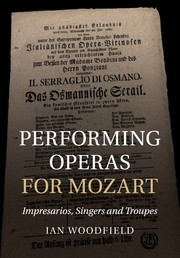Book contents
- Frontmatter
- Contents
- Illustrations
- Figures
- Tables
- Musical examples
- Abbreviations
- Introduction
- 1 Pasquale Bondini
- 2 Die Entführung aus dem Serail
- 3 The Italian troupe in Prague
- 4 The Prague Figaro
- 5 The genesis of Don Giovanni
- 6 The première of Don Giovanni
- 7 The casting of Don Giovanni
- 8 The Leipzig Don Giovanni
- 9 The 1788 Prague Don Giovanni
- 10 Mozart’s music in Leipzig
- 11 Josepha Duschek’s academy (22 April 1788)
- 12 Mozart’s academy (12 May 1789)
- 13 Guardasoni in Warsaw
- 14 The première of La clemenza di Tito
- 15 The Leipzig reception of the Da Ponte operas (1792–1794)
- 16 Guardasoni diversifies
- Conclusion
- Appendices
- Bibliography
- Index
Conclusion
Published online by Cambridge University Press: 05 January 2012
- Frontmatter
- Contents
- Illustrations
- Figures
- Tables
- Musical examples
- Abbreviations
- Introduction
- 1 Pasquale Bondini
- 2 Die Entführung aus dem Serail
- 3 The Italian troupe in Prague
- 4 The Prague Figaro
- 5 The genesis of Don Giovanni
- 6 The première of Don Giovanni
- 7 The casting of Don Giovanni
- 8 The Leipzig Don Giovanni
- 9 The 1788 Prague Don Giovanni
- 10 Mozart’s music in Leipzig
- 11 Josepha Duschek’s academy (22 April 1788)
- 12 Mozart’s academy (12 May 1789)
- 13 Guardasoni in Warsaw
- 14 The première of La clemenza di Tito
- 15 The Leipzig reception of the Da Ponte operas (1792–1794)
- 16 Guardasoni diversifies
- Conclusion
- Appendices
- Bibliography
- Index
Summary
The two impresarios Pasquale Bondini and Domenico Guardasoni directed the Italiänische Opera-Virtuosen for almost exactly a quarter of a century, and they are widely and justifiably credited with having played a major role in Mozart’s career. Their interest came at a critical juncture in the composer’s operatic fortunes. After the final performance of the first Vienna production of Figaro on 18 December 1786, the opera failed at first to make significant progress either in Italy or Germany. Despite two performances in Florence and Monza, apparently on the recommendation of Joseph II, and interest from Haydn in Eszterháza, there appeared to be no immediate plans to stage it in its original language in any of the major European opera houses. Nor, more significantly, did the work transfer quickly to the German stage, despite an early production in Donaueschingen. Indeed, not until the 1788–9 season did Singspiel versions of Figaro begin to feature prominently in the operatic calendar. Coincidentally, this was the period when Don Giovanni, which won widespread acclaim more quickly, also made its mark. All this amounted to a potentially significant hiatus in the development of Mozart’s profile during the 1786–7 and 1787–8 seasons, when only the undiminished popularity of Die Entführung ensured the continuing visibility of his name as a man of the theatre. The enthusiastic espousal by the Italiänische Opera-Virtuosen first of Figaro and then of Don Giovanni thus ran against the general trend, at least for a short period. In otherwise fallow years elsewhere, these works flourished in Prague, and then spread quickly northwards along the well-established cultural thoroughfare linking Bohemia with Saxony. It is hardly surprising that the geography of Mozart’s life began to reflect his improving fortunes in this region, with the visits to Prague in 1786 and 1787 and to Prague, Leipzig and Dresden in 1789.
In his final years, Guardasoni’s reputation in the two cities in which the Italiänische Opera-Virtuosen had been active began to diverge sharply. Long after the heyday of Viennese Italian opera buffa had passed, he continued to promote the genre with single-minded determination. In Prague, critics could see that Italian opera was in a wretched state, but they blamed this on the shortcomings of his tenure as manager. The public onslaught he had to endure in the 1800 season failed to deter him, however, and he remained as impresario up to his end in 1806. The ITS entry for 1808–9 states that following Guardasoni’s death Italian opera in Prague had ceased, which may of course imply only that no reports had been received in the interim. The summary of his career in Gerber’s Lexicon is interesting. He is described as an able man in his field, ‘who was accustomed to insist on the greatest accuracy and precision in the orchestra’, to which end ‘he betrayed the most intimate knowledge of his scores, even the most difficult’. There is no mention of Mozart or his operas. Teuber presents a memorable picture of him towards the end of his life. Resplendent in a magnificent blue and gold-lace coat, and seated in his usual corner stall, he would give the sign for the performance to begin with a stamp of the foot. No matter that there were often only twenty people in the Parterre and sometimes as few as five, an opera would be repeated if it pleased him. Tastes had changed, but the impresario was unable to accept that fact.
- Type
- Chapter
- Information
- Performing Operas for MozartImpresarios, Singers and Troupes, pp. 217 - 219Publisher: Cambridge University PressPrint publication year: 2011



